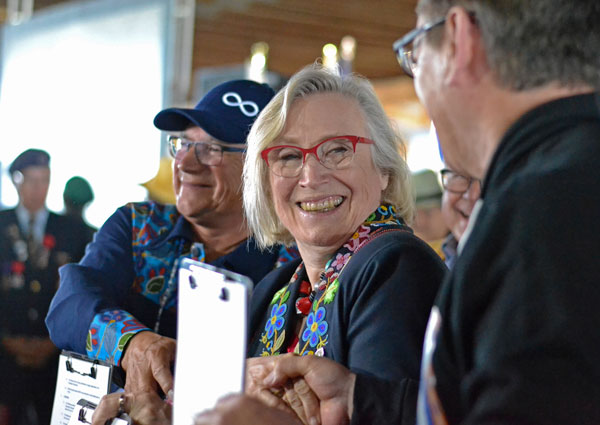
Reconciliation was the theme as federal and provincial ministers met with Métis leaders in Batoche on Friday.
Batoche was the site where the Métis began fighting for their rights in the North-West Resistance under Louis Riel.
It was there, 134 years later, that officials met to sign an agreement aimed at righting further wrongs faced by the Métis people.
“I really think, hope, that your leader Louis Riel would be happy with the progress we’ve made, but would recognize we’ve got lots, much (more) work to do together,” said Minister of Crown-Indigenous Relations Carolyn Bennett in her speech.
Bennet said that Métis children lost their cultures in residential schools and the Sixties Scoop and part of reconciliation is understanding the effects.
“These dark chapters of our history that we never learned in school, the … child abuse, anger shame, drugs, alcohol, suicide, violence, incarceration—it’s a direct link,” she said.
“The task of reconciliation means all Canadians have to understand this.”
Bennett and Métis Nation-Saskatchewan President Glen McCallum signed a memorandum of understanding (MOU) to work towards healing for Île-à-la-Crosse residential school survivors.
This school was not included in the Indian Residential Schools Settlement Agreement that provided financial compensation for former residential schools students.
Bennett described it as being a “sore spot” for several years.
When a reporter asked if there will be compensation, she said their focus is on communication.
In the past, she explained, people would go to court under conflict and get material items.
“What happens when you come to the table is you’re able to listen to the survivors about what they need. A lot of it is about language and culture; it’s about healing; it’s about an apology. You can’t have courts award that.”
McCallum also signed an MOU with the RCMP, agreeing to work together moving forward towards reconciliation.
Communication also came up in Minister of Indigenous Services Seamous O’Regan’s speech.
“We will work with you to make sure more and more children are in their community with their loved ones, with their culture, with their language, with their traditions—where they belong,” he said.
O’Regan said the beginning of reconciliation is in sight.
“I’m starting, starting to begin to feel like we’re making a difference; starting to believe that the path before us is clearer; starting to believe that there is real change and that real change is only possible if we do that together, because real solutions come from the bottom up, not from the top down.”
McCallum stood behind the podium in a navy blue ball cap showing the Métis symbol: an infinity sign. It represents the joining of the two cultures.
He began his speech honouring his roots.
“Every time I speak in front, I start speaking my language because that’s who I am as a Métis, and a very proud Métis.”
He went on to talk about the resilience of his people.
“It’s up to us to be able to stand up and say ‘Yes, we are ready to speak’ and to be able to work with you,” said McCallum.
“It’s always asking somebody else to find the answer for us. No, we won’t do that anymore. We have the availability to be able to structure ourselves in a way with supportive government to be able to do the things that we want as Metis,” he told reporters following his speech.
Warren Kaeding, minister responsible for First Nations, Métis and Northern Affairs, was at the event on behalf of the provincial government.
However, the province was not involved in the Île-à-la-Crosse signing.
“We have a very good relationship with the federal government and working with them, and we’ll have the same kind of relationship with the province as we move forward,” said McCallum.
Other dignitaries included Minister of Batoche Sherry McLennan, Métis Senator of Canada Yvonne Boyer and Métis National Council President Clément Chartier.

